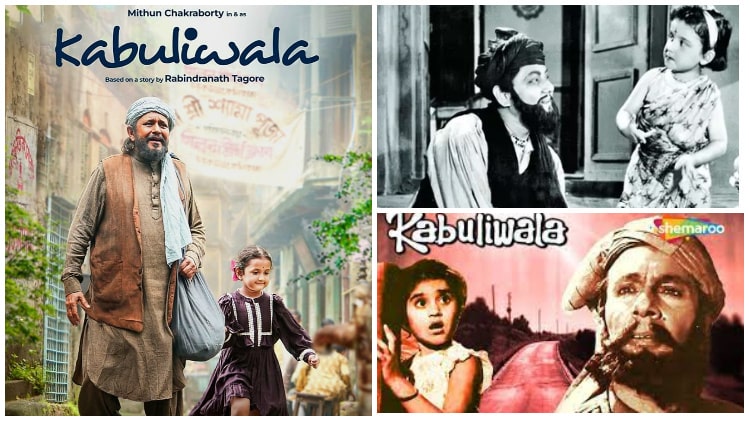Sandip Ray, eminent journalist Roshmila Bhattacharya, and I were discussing Bengali cinema at the Ray residence. I informed them that I was unhappy with Suman Ghosh’s Kabuliwala as it was no match for the former Bengali and Hindi adaptations by Tapan Sinha and Heman Gupta. Sandip Ray never point-blank criticizes anyone. He simply smiled and said, ‘Classics, once created, should not be remade.’ Roshmila agreed with him.
I could not digest Mithun Chakraborty as the benevolent Kabuliwala based on Tagore’s immortal story. The first Bengali Kabuliwala had Chabi Biswas in the title role deliver a performance of a lifetime. The background musical score by Pandit Ravi Shankar with an echo of Afghanistan, Ya Muistana, was mind-blowing. Kabuliwala did win an award at the Berlin Film Festival. The master actor’s interactions with child artist Tinku Tagore (Mini) were lessons in acting. As Satyajit Ray rightly mentioned, no other actor could immortalize Kabuliwala like Chabi Biswas or Balraj Sahni.
The Hindi adaptation produced by Bimal Ray had his directional touches followed well by Hemen Gupta. Ashok Kumar once told me that he gave admirable marks to Balraj Sahni as he sat with Kabuliwalas and meticulously observed their ways of life. In the film, as Balraj Sahni prays for Mini to recover from ill health, he was unmatched. According to Tapan Sinha, Balraj Sahni was a better Kabuliwala than Chabi Biswas. Salil Chowdhury’s haunting melodies, ‘Aye Mere Pyare Watan’ and ‘Ganga Aye Kahan Se,’ added to the film’s musical genre.
Mithun Chakraborty appears as a miscast Kabuliwala. Though a Mrinal Sen discovery, he is no match for the acting calibers of Chabi Biswas or Balraj Sahni. His histrionic abilities are too limited. Director Suman Ghosh went wrong in his attempt to remake Kabuliwala. The essence of Tagore’s classic literature is missing in his script. No wonder Mrinal Sen was correct in saying modern Bengali directors lack the ability of script narration.
Aparna Sen is certainly better in this aspect compared to Srijit Mukherjee or Suman Ghosh. However, with the exceptions of ’36 Chowringhee Lane’ and ‘Mr. & Mrs. Iyer,’ none of her other films have stood the test of time like earlier films by Ajay Kar, Asit Sen, and Bijay Bose. Though these directors followed the path of middle or commercial cinema, they penned aesthetically rich scripts as evident from ‘Saat Pake Bandha,’ ‘Deep Jwele Jai,’ and ‘Arogya Niketan.’
Kaushik Ganguly, the most promising director of this generation, attempted ‘Palan,’ a sequel to ‘Khanij.’ He admits, ‘The concept of mainstream Bengali cinema has undergone a big change.’ ‘Palan’ is nowhere compared to ‘Kharij.’ Goutam Ghose states, ‘My ‘Abar Aranaye’ was a continuation of ‘Aranayer Din Ratri.’ It was my tribute to author Sunil Gangopadhyay and director Satyajit Ray.’ Though ‘Abar Aranye’ is nowhere compared to Ray’s ‘Aranayer Din Ratri,’ Goutam Ghosh confesses that classics created earlier should not be remade.
Roshmila Bhattacharya pointed out, ‘Srijit Mukherjee’s ‘Hotel Shahjahan’ was no comparison to its original ‘Chowringhee’ in 1969.’ I agreed, as I also was frustrated viewing ‘Hotel Shahjahan’ and did directly tell actress and danseuse Mamata Shankar how forgettable she was in the film. She had no answer, and I am sure she did not appreciate my comment.
Contemporary Bengali cinema, as I have often said, dangerously lacks talent in every department of filmmaking. The majority of the films released pale into oblivion quickly. The present filmmakers need to strictly concentrate on content, cinematic narrative, and originality. I remember Satyajit Ray telling me more than three decades ago that, in the future, Bengali cinema will face a severe creative crisis. This saying has proved prophetic.
If Steven Spielberg could refrain from recreating ‘Diary of Anne Frank,’ why not loud-mouthed, mediocre Bengali directors? Noted film academician Sanjay Mukhopadhyay says, ‘Instead of recreating earlier memorable films, present-generation directors should concentrate on fresh, well-timed themes that appeal both to a viewer’s intelligence and heart.
